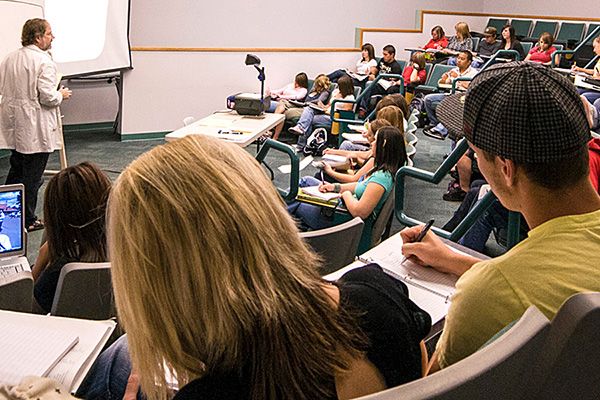NPC's Office of Accessibility and Inclusion works with faculty to provide student accommodations. We are committed to providing equitable access and opportunities to all persons and raising awareness and understanding of other perspectives and experiences. Expand your knowledge and awareness of people with disabilities to help NPC be a welcoming and inclusive environment.
NOTE TO ALL NPC FACULTY: Copy and paste the following statement into your syllabus: Any student eligible for academic accommodations due to a disability or anyone who would like to consult with the Office of Accessibility and Inclusion (OAI) should visit our webpage www.npc.edu/oai and complete Step 1 “Contact for Services” to get things started. If you have question you can contact the office at 928-536-6246. or visit our webpage www.npc.edu/oai for additional information.
NOTE TO ALL NPC FACULTY: Copy and paste the following statement into your syllabus: Any student eligible for academic accommodations due to a disability or anyone who would like to consult with the Office of Accessibility and Inclusion (OAI) should visit our webpage www.npc.edu/oai and complete Step 1 “Contact for Services” to get things started. If you have question you can contact the office at 928-536-6246. or visit our webpage www.npc.edu/oai for additional information.
Faculty Rights and Responsibilities
Faculty Rights >
Faculty has the right to:
- Decline requests for accommodations that have not been granted through the Office of Accessibility and Inclusion.
- Meet with the Office of Accessibility and Inclusion to discuss when and if they believe an accommodation request fundamentally impacts the integrity of the course/program; creates undue financial burden on the school, or if it causes a safety issue.
- Collaborate with the Office of Accessibility and Inclusion about how to meet the needs of a student with a disability.
- Receive and implement notification of academic accommodations
- Discuss alternatives to a requested accommodation if a better method is available.
Please note: Faculty should avoid asking students if they have or about a disability, or about the nature of the disability relevant to their granted accommodations. However, if students choose to disclose their disability, this information should be treated as confidential.
Faculty Responsibilities >
Faculty has the responsibility to:
- Provide an accepting classroom environment for students with disabilities characterized by non-discrimination.
- Work with the Office of Accessibility and Inclusion when a request for accommodation is made. Discuss needs individually and in a timely manner with students requesting accommodations.
- Support students who have been granted reasonable accommodations and services by the Office of Accessibility and Inclusion.
- Consult with the Office of Accessibility and Inclusion regarding the laws related to teaching students with disabilities.
- Make sure their instructional materials, methods, and programs are accessible, effective, and equally integrated. Faculty may consult with the Office of Accessibility and Inclusion and also the Instructional Technology and Curriculum Support to provide accessible materials.
- Evaluate students solely on ability, not disability. If an evaluation method or criteria has an adverse impact on a student's performance due to a disability, the faculty member should seek alternative means for evaluation.
- Treat and protect all disability-related information as confidential information.
- Read the recommended ADA syllabus insert (provided on this page) verbatim on the first day of class (as recommended by the Office of Civil Rights).
Institutional Rights and Responsibilities >
Northland Pioneer College through the Office of Accessibility and Inclusion has the right and responsibility to:
- Maintain the College's academic standards.
- Discuss student's eligibility given signed consent.
- Select from among equally effective/appropriate accommodations, adjustments, and/or auxiliary aids in consultation with the student.
- Deny requests for accommodations, academic adjustments, and/or auxiliary aids that are inappropriate or determined unreasonable based on if the accommodation:
- Presents as a direct threat to the health and safety of others
- Creates a substantial change or alteration of an essential element of a course/program standard
- Causes an undue financial or administrative burden on the College
Accomodations
Academic accommodations are determined during our interactive process and are granted on an individual analysis of the student's circumstances. The accommodations described below are not guaranteed, and this does not represent an inclusive list. It is the student's responsibility to inform their instructors of their accommodations to ensure their appropriate implementation.
- Testing Accommodations
- Classroom Environment Accommodations
- Instructional Accommodations
- Assistive Technology and Auxiliary Accommodations
Extended Time
- Students may be granted additional time for all exams and in-class quizzes. Extended time is typically approved in increments of either one and one half or double the allotted time and ensures that a student’s performance is reflective of his/her mastery of material rather than the speed at which a student performs.
- Certain skills-based tests are meant to mimic the real-life experience. Therefore, it may not be reasonable to have extended time during skills-based tests (eg., labs, practicals, clinicals).
Distraction-Limited Environment
- If granted, a “distraction-limited environment” testing space can be provided at the NPC Libraries or in an alternate classroom. This accommodation does not guarantee a “distraction free” testing space, but rather a quieter space where students have fewer distractions, thus better able to maintain focus.
Readers for Exams
- Some students with disabilities may need tests read to them. OAI works with the student to provide this support either by use of computer software, built-in accessibility tools or a person to read to them. Please note that if the student’s need is to have a person read their test it must be scheduled at least 5 business days before the test date.
Preferential Seating
- While reasons for accessible seating vary widely, OAI can assist with this in addition to any modifications to classroom furniture, which may be necessary due to a disability.
Classroom Breaks or Moving About in Class
- For some students with disabilities, sitting for long periods of time can exacerbate symptoms of the disability. Similarly, some students may need to leave class for brief periods to attend to medications or other medical needs. This accommodation allows the student to move around or leave class in the least disruptive manner possible.
Use of Spell Check
- Correct spelling at the college level is expected of all students. However, students with a specific learning disability, which impacts spelling, may be eligible to receive a reasonable accommodation for in-class assignments and in-class exams. Typical accommodations have included spell-check devices or not penalizing a student for spelling errors.
Digitally Record Class Lectures
- Recording class materials is allowed when the student provides notification of the accommodation to the instructor. The student may discuss with the instructor the best placement of the recording device. To protect the privacy of others, instructors have the right to request that students turn off any recording if the discussion involves the sharing of personal information.
Authorized class recordings by students are for study purposes only and may not be uploaded to the internet, or otherwise shared, transmitted, or published without the prior written consent of the person teaching the class and others who were recorded.
Advance Access to Course Materials
- Students with disabilities may request that an instructor make course materials (ex., overheads, Power Point slides, checklists, study guides, etc.) available for review. Instructors are not required to create new materials. Instead, instructors might post the materials on Moodle for all students, email, make copies of the materials and distribute these copies to students or allow a student to review the PowerPoint slides during office hours. Students should work with their instructor(s) to determine an appropriate time frame for viewing materials.
- *Communicate w/OAI for further assistance regarding the implementation of any student accommodations 928-536-6246 or oai@npc.edu
E-text
- Students may request digital versions of their textbooks that work with text-to-speech, magnification, screen reader technologies, and more.
American Sign Language (ASL) Interpreters
- The role of the Sign Language Interpreter within the postsecondary setting is to facilitate communication between (D)deaf/Hard of Hearing and hearing individuals throughout the educational environment, both academic and extracurricular.
Attendance Support and Extension Dates
Attendance Support as an Accommodation >
Instructors are expected to provide students information regarding attending policies, and assignment and test dates in a timely manner.
Students are responsible for attending class and expected to complete all assignments as scheduled. However, if a student must miss class due to a disability-related concern, it is reasonable to allow an extension for assignment completion.
Requests for accommodations for absences due to a disability should be considered on an individual and course-by-course basis, acknowledging that the core competencies and learning outcomes of the course will not be modified.
Student Responsibilities
- The use of this accommodation should be established before absences become an issue. Instructors are only required to provide approved disability-related accommodations after receiving the Accommodation Notification Letter. Students are advised to discuss the implementation of each accommodation with their instructors prior to needing to use them.
- Students are advised to email their instructors when needing to miss class because of their disability. If there are assignments or tests missed during the absence the student is responsible for planning with their instructor to make up the work/test. The method and timing of notification of absences and making up any materials, exams, assignments, etc. missed due to the absence should be mutually agreed upon.
- When students are absent due to a disability-related circumstance, students are still responsible for the course content, lecture notes and information presented that day.
- Students are not required to present the instructor with medical documentation verifying their disability-related absence but may be required to document other non-disability related absences as per the syllabus requirements.
- If student absences exceed a reasonable amount of time that impacts access to learning and the integrity of the core competencies or learning outcomes, OAI should be informed to assist in mitigating any concerns about the accommodation and its implementation.
- Additional documentation from a treating physician may be requested by OAI to determine if an adjustment to the accommodation or granting additional accommodations may be appropriate.
(Adapted from University of Washington Disability Resources for Students, Disability Related Absences Agreement and similar agreements from other colleges and universities)
Office for Civil Rights Guidance
Attendance Modification & Deadline Extensions for Assignments >
Please consider the following to determine the reasonable provision of this accommodation.
- What is the format of your course? (ex., hybrid, face-to-face, online, remote)
- Are there classroom practices and policies regarding attendance standards? (ex., syllabus, department policies, state policies)
- Is the attendance policy consistently applied? '
- Is attendance factored in as part of the final course grade?
- Is there classroom interaction between faculty and students, and/or among students?
- Do student contributions constitute a significant component of the learning process?
- Does the course rely on student participation as a method of learning?
- Does the student’s attendance provide valuable impact on the educational experience of other students in the class?
- Would you be able to justify that a student will not have learned and would not be able to pass your class if they miss more days beyond your stated attendance policy?






